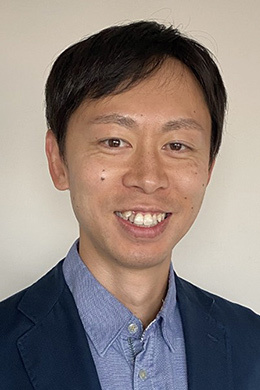Structural Basis of Lipid and Anesthetic Action on TMEM16 Scramblases
 Yusuke Sugasawa, MD, PhD
Yusuke Sugasawa, MD, PhD
Associate Professor, Department of Anesthesiology
Juntendo University
Tokyo, Japan
In 2020, as a Clinical Associate Professor in Anesthesiology at Juntendo University School of Medicine, Yusuke Sugasawa, MD, PhD, became the first investigator from a Japanese university to be recognized with an IARS Mentored Research Award for his research on “Structural Basis of Lipid and Anesthetic Action on TMEM16 Scramblases.” With this study, Dr. Sugasawa hoped to characterize cholesterol binding sites on TMEM16 scramblases and determine how cholesterol occupancy of these sites modulates scramblase activity. Now an Associate Professor in Anesthesiology at the same institution, Dr. Sugasawa and his research team are preparing a manuscript to share their study outcomes which will provide novel insights into the interaction between lipids and TMEM16 scramblases, and contribute to the development of structure-based drug design of TMEM16 modulators. He is optimistic that this may be useful in treating perioperative bleeding and neurological dysfunction in the future. Below, Dr. Sugasawa shares his research journey since receiving the IMRA, the value of the award to his research and career and his hopes for the future of anesthesia research.
1. What is your current position? How long have you been in this position? What was your role when you were first funded by IARS?
My current position is Associate Professor in the Department of Anesthesiology at Juntendo University in Tokyo. I have been teaching medical students and clinical anesthesiology residents/fellows in this position for two years. I was a Clinical Associate Professor when I was first funded by IARS.
2. What was the goal of your initial research project? Was it met?
The goal of my initial research project was to characterize cholesterol binding sites on TMEM16 scramblases and determine how cholesterol occupancy of these sites modulates scramblase activity. I believe it has been met and we are preparing for a paper submission.
3. How did your findings impact patient care and how did your research impact the field of anesthesiology?
The outcome of this project will provide novel insights into the interaction between lipids and TMEM16 scramblases, and contribute to the development of structure-based drug design of TMEM16 modulators, which may be useful for treating perioperative bleeding and neurological dysfunction.
4. Has your research subject area evolved since the award?
Recently, a great number of articles were published in this research field. I expect that our findings will become an important piece of evidence to elucidate the mechanism of lipid scrambling.
5. How did the award affect your research/professional trajectory?
The award was highly valued by the department, and allowed me some time for research activities protected from clinical duty.
6. How do you feel about having received the IARS Mentored Research Award?
It was a great honor to become the first recipient of the award presented to a Japanese University.
7. What would you like to convey to our donors, the people who made this award possible?
I thank them from the bottom of my heart for giving me a precious chance to start my own laboratory. I’m sure that their great contribution significantly accelerates development in anesthesiology research.
8. What drew you to academic anesthesiology and to your particular area of research?
The research questions that I am pursuing are rooted in my clinical experience as an anesthesiologist. To prepare for a scientific career, I undertook PhD training in clinical science followed by post-doctoral training in electrophysiology, where I addressed important questions regarding anesthetic effects on ion channel function. This experience led to a second research fellowship where I continue studying the structural basis of anesthetic and bioactive sterol binding to membrane proteins.
9. What is something that someone would be surprised to learn about you?
It would probably be that I was the first recipient of the award presented to a Japanese University.
10. What do you hope for the future of anesthesia research?
I hope for steady growth in the number of the anesthesiology physician-scientists working on basic science to elucidate molecular mechanisms of anesthetics around the world.
“The outcome of this [IMRA-funded] project will provide novel insights into the interaction between lipids and TMEM16 scramblases, and contribute to the development of structure-based drug design of TMEM16 modulators, which may be useful for treating perioperative bleeding and neurological dysfunction.”
– 2020 IARS Mentored Research Award Recipient Yusuke Sugasawa, MD, PhD
International Anesthesia Research Society
